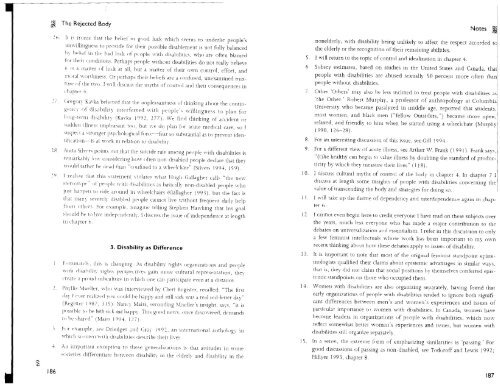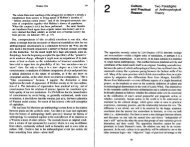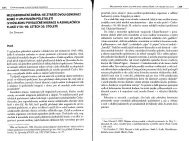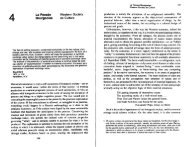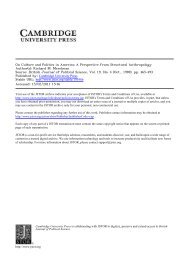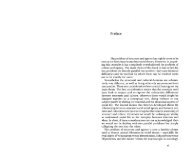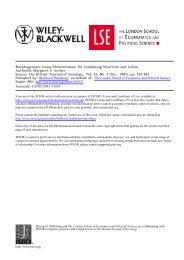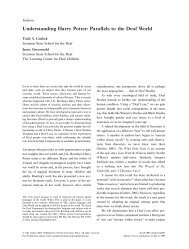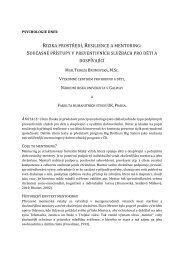The Social Construction of Disability - Moodle
The Social Construction of Disability - Moodle
The Social Construction of Disability - Moodle
Create successful ePaper yourself
Turn your PDF publications into a flip-book with our unique Google optimized e-Paper software.
0'-.0~ <strong>The</strong> Rejected Body2f>.It i, ironic that the belief in good luck which seems to underlie people'sullwilllllgness to provide for their possible disablement is not fully balancedhy \w!i"f in tilt' bad luck 'If pl'ople with disabilitit" who are <strong>of</strong>ten blamedf',r their condition, Perhaps people without disabilines do not really believeit IS a matter or luck at all, hut a matter <strong>of</strong> their own control, effort, and111.3. <strong>Disability</strong> as DifferenceF',ltunatcly, iilis h changmg A.s cIis,lbJ!ity fights orgJnizati'll1S and peoplewith disahlJiry righ,s pClspeniYt's gain Illnre cultural representation. tlie ,('reclte a [Houd subculture in whirl: aile call participate even at a distance.Phyllis \1ueller, who was inte-rviewed hy Cheri Register, recalled: "<strong>The</strong> firstd,l) I t'H'r reali?C·d you muld be happy and still sick was a rcai red-letter day"(Register 1987, 3 I 5). Nancy Mairs, seconding tIlneller's inSight. says, "it ispOSSible tn be both sick and happy. This gnod ne wv. once discovered. demandst< I he shUt'c\" (Mairs \ 99+. 127).For exalllple, stl:' Driedger JI](i Cra) 1992, an intefllJtional a\llhol,)g)' inwhich \\(nllell wuh disabilltws descrihe their !i\'es+ .-\n importanr exception to these generJlizJtiol1s is that attitude-s ill srnues()cietiC', differentiate between disability ill the elderly and disability in theNotes ~noneIderly, with disability being unlikely to affect the respect accorded tthe elderly or the recognition <strong>of</strong> their remaining abilities.5. I will return to the topic <strong>of</strong> control and idealization in chapter 4.6. Sobsey estimates, based On studies in the United States and Canada, thatpeople with disabilities are abused sexually SO percent more <strong>of</strong>ten thanpeople without disabilities.7. Other 'Others' may also he less inclined to treat people with disabilities as'the Other.' Robert Murphy. a pr<strong>of</strong>essor <strong>of</strong> anthropology at ColumbiaUniversity who became paralyzed in middle age, reported that students,most women, and black men ("fellow Outsiders, ") became more open,relaxed, and friendly to him when he started using a wheelchair (Murphy1990.126-28).8. For an interesting discussior; <strong>of</strong> this issue, see Gill 1994.9. For a different view <strong>of</strong> acute illness, see Arthur W. Frank (1991). Frank says,"(tihe healthy can begin to value illness by doubting the standard <strong>of</strong> productiv-ityby which they measure their lives" (118).10. I discuss cultural myths <strong>of</strong> control <strong>of</strong> the body in chapter 4. In chapter 7 II I.discuss at length some insights uf people with disabihties concerning thev-alue <strong>of</strong> transcending the body and strategies for doing so.I will take up the theme <strong>of</strong> dependency and interdependence again in chapter612 I cannot even begin here to credit everyone I have read on these subjects overthe years, much less ev-eryone who has made a major contribution to thedebates on universalization and essentialism. I refer in this discussion to onlya few feminist intellectuals whose work has been important to lIly ownrecent thinking about how these debates apply to issues <strong>of</strong> disability.I+.J 5.13. It is important to note that most <strong>of</strong> the original feminist standpoint epistemologistsqualified their claims about epistemic advantages in similar ways,that is, they did not claim that social positions Ill' themselves conferred cpistemicstandpoints on those who occupied them.Women with disabilities are also organizing separately, having found thatearly organizations <strong>of</strong> peoplE' with disabilities tended to ignore both significantdifferences between men's and worneris experiences and issues <strong>of</strong>particular importance to women with disabilities. In Canada, women havebecome leaders in nrganizations <strong>of</strong> people with disabilities, which nowreflect somewhat better women's experiences and issues, hut women withdisabilities still organize separatelyIn a sense, the extreme form <strong>of</strong> emphasiZing similarities is 'passing.' Forgood discussions <strong>of</strong> passmg as non-disabled, see Todor<strong>of</strong>f and Lewis 1992:Hillyer 1993, chapter 8.187


